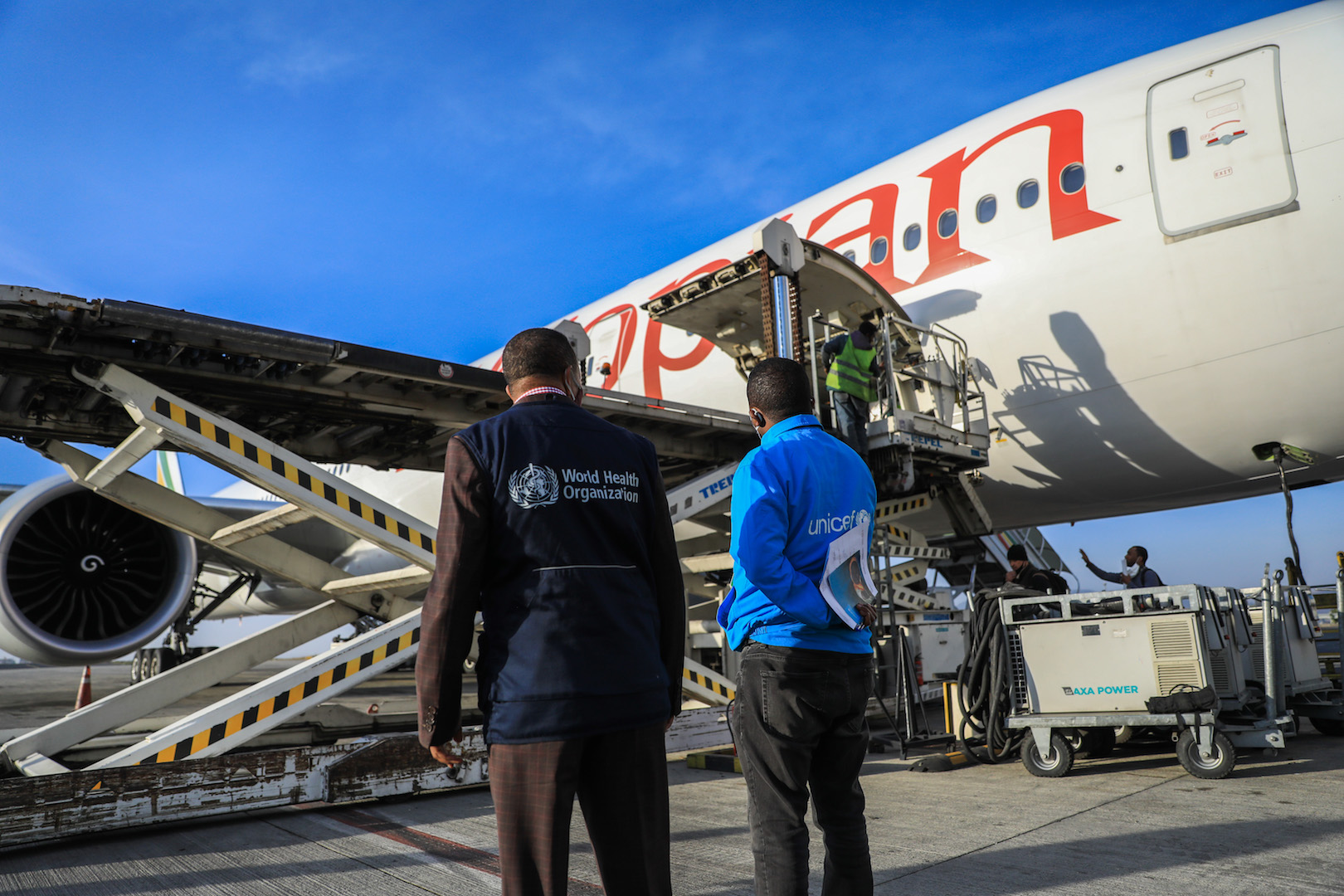Annette Bauer and Sara Evans-Lacko discuss the case for expanding the focus of cash transfer programmes to address the longer term consequences of the macroeconomic crisis on youth mental health and life chances. This blog is based on their recent commentary in Lancet Psychiatry and research by the CHANCES-6 team which looks at the links between youth mental health, poverty and life chances in low- and middle-income countries (LMICs).
In many LMICs, social protection measures, such as cash transfer programmes, have played and continue to play an important role in saving lives and securing livelihoods during the COVID-19 pandemic, including those of young people. By improving outcomes like school attendance [1], cash transfers have the ability to positively influence young peoples’ life chances. They also may play an important role in mitigating some of the long-term economic, social and (mental) health impacts of the COVID-19 pandemic.
Cash transfer programmes, which make direct payments to individuals or families identified as living in poverty, conditional or unconditional to certain requirements like school or health check attendance, are one of the most common social protection measures reaching substantial proportions (15 to 20%) of the total populations in LMICs like Brazil, Colombia, Mexico and South Africa [2]. Because of their rapid expansion in response to the pandemic, they have gained even more importance over the past year [3]: Of the altogether 1,414 social protection measures, introduced or adapted between March and December 2020 globally, a third were cash transfer programmes.
Whilst young people (aged 15 to 24) are an important beneficiary group of cash transfer programmes, most programmes do not specifically target them, and cash is given to the primary caregiver. Considering that young people represent about twenty percent of the world’s population [4], of which the majority live in LMICs, cash transfer programmes may play an important role in reaching out to this population, and meet their specific needs. Because of the well-established link between mental health and poverty [5] and the burden of the pandemic on youth mental health, we argue that programmes should incorporate mental health.
Why should we prioritise the mental health of young people living in poverty during the pandemic?
Young people living in poverty are particularly vulnerable to being exposed to violence, exploitation, and social isolation during this pandemic, all of which exacerbate existing or create new mental health problems [6, 7]. Impacts of the pandemic on youth mental health and on poverty are likely to strongly exacerbate each other, leading to a downward spiral. How well young people’s mental health, in addition to their economic situation, are supported during and after the pandemic is likely to influence how well they will do in the future, affecting for example their education and employment opportunities.
Inevitably during crises, policy makers prioritise the most immediate concerns, such as providing food and medical care to those at risk of malnutrition and illness. Mental health is typically given lower priority, because of lower awareness of its impact on mortality and morbidity. However, crises also present opportunities to change systems and priorities.
Experiences from past emergencies show that mental health can become a priority for system reform [8]. As government departments might have greater incentives to work together on system-wide responses, this also offers new opportunities for promoting long-term economic and mental health resilience in line with the United Nation Sustainable Development Goals.
Therefore, there is an opportunity for health policy makers to highlight just how important mental health is to the current and future economic wealth of countries, and to highlight the benefits of addressing mental health and poverty together.
How might cash transfer programmes contribute to improving youth mental health?
Although not always an intentional programme goal, evidence from programmes in Latin America and Africa suggests that they can reduce suicide incidence by up to 10% [9,10], improve depressive symptoms among adults [11], and, if aimed at young people, reduce depressive symptoms by between 24 and 38 per cent [12,13]. A recent review found that the majority (85%) of studies showed a significant positive impact of cash transfers on at least one mental health outcome in children and young people [14]. The ways by which programmes achieve such improvements need to be better understood [15] but include increased self-confidence, self-worth and hope that come along with being able to go to school and buy and do things they would not be able to do without the programme.
Informed by evidence from evaluations of cash transfer programmes and mental health responses to crises and epidemics, we suggest the following five recommendations:
- Cash transfer programmes should specifically target vulnerable young people with or at risk of mental health conditions. This can include using existing routes to identifying vulnerable young people but might also require changing welfare systems so that mental health conditions are explicitly included within disability criteria (in line with international law and recommendations by the World Health Organization). Mental health conditions could then be considered an eligibility criterion for receiving cash transfer programmes. Targeting might also involve creating ways to reach out to young people via digital technologies, including to those who are not able to access any other form of support;
- Cash transfer programmes should explore the provision of resources to support mental health and non-stigmatising information about COVID-19. Evidence from previous and current pandemics suggest that misinformation and stigma about the pandemic present great threats to mental wellbeing. Donor organisations, such as UNICEF, have set good examples in the education field, requesting that education programmes for school-aged children also include anti-stigma (in relation to COVID-19) and mental health promotion messages [16];
- Cash transfer programmes can be designed to facilitate access to mental health support for young people. This means strengthening access to mental health interventions, as well as potentially, where resources and infrastructure permit, offering mental health interventions or support as part of cash transfer programmes. In addition to offering treatment, interventions might include those that promote positive mental health and resilience;
- Mental health impacts should be considered when making decisions about the amount, duration and administration of cash transfer programmes. Uncertainty about whether and when payments will be made can have major impacts on psychological stress, and this should be reduced by making payments predictable, and communicating clearly and in good time about planned changes to payments;
- Evaluations of cash transfer programmes should include an assessment of their mental health impacts so that this knowledge can inform our understanding of the scale of mental health problems during this crisis, and the contribution of cash transfer programmes in addressing these.
Of course, the extent to which recommendations are applicable and can be implemented in countries will depend on existing infrastructure offered by cash transfer programmes and other social protection measures, mental health care, and other sectors such as education. Similarly, recommendations would apply differently for countries or regions depending on the state of the pandemic they are in.
There are compelling reasons to integrate mental health into social protection programmes, particularly for young people. There is an opportunity now to highlight just how important youth mental health is to the current and future economic wealth of countries, and to highlight the benefits of addressing mental health and poverty simultaneously.
References
[1] Baird S, Ferreira F, Özler B, Woolcock M (2014), Conditional, unconditional and everything in between: a systematic review of the effects of cash transfer programmes on schooling outcomes, Journal of Development Effectiveness, 6:1, 1-43, DOI: 10.1080/19439342.2014.890362
[2] Bauer A , Araya R, Avendano-Pabon M,…., Evans-Lacko (in Press), Examining the dynamics between young people’s mental health, poverty and life chances in six low- and middle-income countries: protocol for the CHANCES-6 study, Social Psychiatry and Psychiatric Epidemiology
[3] Gentilini U, Almenfi M, Dale P. Social Protection and Jobs Responses to COVID-19: A Real-Time Review of Country Measures. “Living paper” version 14 (December 11, 2020) http://documents1.worldbank.org/curated/en/467521607723220511/pdf/Social-Protection-and-Jobs-Responses-to-COVID-19-A-Real-Time-Review-of-Country-Measures-December-11-2020.pdf
[4] Khokhar, T (2017), How is the world’s youth population changing? Data Blog, World Bank.
[5] Lund C, De Silva M, Plagerson S, Cooper S, Chisholm D, Das J, Knapp M, Patel V. Poverty and mental disorders: breaking the cycle in low-income and middle-income countries. Lancet. 2011 Oct 22;378(9801):1502-14. doi: 10.1016/S0140-6736(11)60754-X. Epub 2011 Oct 16. PMID: 22008425.
[6] Lee J. Mental health effects of school closures during COVID-19. The Lancet Child & Adolescent Health 2020; 4(6): 421.
[7] Save the Children. Children at Risk of Lasting Psychological Distress from Coronavirus Lockdown: Save the Children Releases New Survey Results. 2020.
[8] WHO. Building back better: sustainable mental health care after emergencies. Geneva: World Health Organization (WHO), 2013.
[9] Alves FJO, Machado DB, Barreto ML. Effect of the Brazilian cash transfer programme on suicide rates: a longitudinal analysis of the Brazilian municipalities. Soc Psychiatry Psychiatr Epidemiol 2019; 54(5): 599-606.
[10] Christian C, Roth C (2016) Can cash transfers prevent suicides? Experimental evidence from Indonesia. Social Science Electronic Publishing. Outubro, 2016. Disponível em SSRN.
[11] Ozer EJ, Fernald LC, Weber A, Flynn EP, VanderWeele TJ. Does alleviating poverty affect mothers’ depressive symptoms? A quasi-experimental investigation of Mexico’s Oportunidades programme. International Journal of Epidemiology 2011; 40(6): 1565-76
[12] Kilburn K, Thirumurthy H, Halpern CT, Pettifor A, Handa S. Effects of a Large-Scale Unconditional Cash Transfer Program on Mental Health Outcomes of Young People in Kenya. The Journal of adolescent health : official publication of the Society for Adolescent Medicine 2016; 58(2): 223-9.
[13] Baird SdH, Jocobus; Ozler, Berk. Income shocks and adolescent mental health. Washington D.C.: The World Bank Development Research Group, Poverty and Inequality Team, 2011.
[14] Zimmerman A, Garman E, Avendano-Pabon M, …, Lund C. The impact of cash transfers on mental health in children and young people in low-income and middle-income countries: a systematic review and meta-analysis. BMJ Glob Health. 2021 Apr;6(4):e004661. doi: 10.1136/bmjgh-2020-004661.
[15] Ridley M, Rao G, Schilbach F, Patel V. Poverty, depression, and anxiety: Causal evidence and mechanisms. Science. 2020 Dec 11;370(6522):eaay0214. doi: 10.1126/science.aay0214. PMID: 33303583.
[16] UNICEF (2020). UNICEF scales up support in 145 countries to keep children learning, as COVID-19 forces majority of schools worldwide to close. Available from: https://www.unicef.org/press-releases/unicef-scales-support-145-countries-keep-children-learning-covid-19-forces-majority
The views expressed in this post are those of the author and in no way reflect those of the Global Health Initiative blog or the London School of Economics and Political Science.
Photo by Delaney Turner on Unsplash




